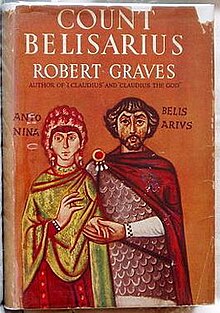Count Belisarius
This article needs additional citations for verification. (December 2009) |
 First US edition | |
| Author | Robert Graves |
|---|---|
| Language | English |
| Genre | Historical novel |
| Publisher | Random House (US) Cassell (UK) |
| Publication place | United Kingdom |
Count Belisarius is a historical novel by Robert Graves, first published in 1938, recounting the life of the Byzantine general Belisarius (AD 500–565).
Just as Graves's Claudius novels (I, Claudius and Claudius the God and his Wife Messalina) were based on The Twelve Caesars of Suetonius and other Roman sources, Count Belisarius is largely based on Procopius's History of Justinian's Wars and Secret History. However, Graves's treatment of his sources has been criticized by the historian Anthony Kaldellis, who writes that "There are many historical novels set in the early sixth century, but none can be recommended that are both historically accurate and well-written. R. Graves's Count Belisarius... is at least well-written."[1]
Count Belisarius purports to be a biography written by Eugenius, a eunuch who is a servant of Belisarius' wife Antonina. The novel covers the entire life of Belisarius, with the bulk of the text being devoted to accounts of his life while on campaign in North Africa and Italy. Antonina was often with him during these years, and Graves uses stories about her connections to the court of the Emperor Justinian and his Empress Theodora to incorporate political intrigue and other information into the story of Belisarius' military exploits.
Graves's treatment of Belisarius is mostly respectful: the general is, if anything, hampered by his rigid code of honour and loyalty to his Emperor. Other primary characters do not fare so well. Antonina and Theodora are presented as extremely intelligent and capable individuals who are nevertheless prone to holding grudges and to jealousy. Justinian is portrayed as intelligent but reckless, a tragically poor judge of character, and a spendthrift, though driven by genuine piety. Graves recounts how Belisarius suffers trying to satisfy the whims of the two rulers.
Notes
- ^ Kaldellis's translation of Procopius, The Secret History, with Related Texts, 2010, ISBN 1-60384-180-6, p. lxxix.
Further reading
- Graves, Robert; Count Belisarius, Farrar, Straus and Giroux, (1982 paperback) ISBN 978-0-374-51739-7
